- Home
- Elizabeth George
Deception on His Mind Page 5
Deception on His Mind Read online
Page 5
Sahlah's gaze faltered under Rachel's. Her hand went to one of the bars on the children's cot, and her fingers grasped it. “Believe me, Rachel. This is what I must do.”
She looked as if she was trying to say more, but Rachel had no ability to draw inferences. She tried to read Sahlah's face to understand what emotion and meaning underlay her statement. But she couldn't grasp it. So she said, “Why? Because it's your way? Because your father insists? Because you'll be thrown out of your family if you don't do like you're told?”
“All of that's true.”
“But there's more, isn't there? Isn't there more?” Rachel hurried on. “It doesn't matter if your family throw you out. I'll take care of you, Sahlah. We'll be together. I won't let anything bad happen to you.”
Sahlah let out a soft, ironic laugh. She turned to the window and looked at the afternoon sunshine that beat relentlessly down on the garden, drying the soil, desiccating the lawn, robbing the flowers of life. “The bad's already happened,” she said. “Where were you to stop it?”
The question chilled Rachel as no breath of cool wind could have done. They suggested that Sahlah had come to know the lengths to which Rachel had been willing to go in order to preserve their friendship. Her courage faltered. But she couldn't leave the house without knowing the truth. She didn't want to be faced with it, because if the truth was what she thought it might be, she would also be faced with the knowledge that she herself had been the cause of their friendship's demise. But there was no way round it that Rachel could see. She had barged her way in where she wasn't wanted. Now she would have to learn the cost.
“Sahlah,” she said, “did Haytham—” She hesitated. How to ask it without admitting the ugly extent to which she'd been willing to betray her friend?
“What?” Sahlah asked. “Did Haytham what?”
“Did he mention me at all to you? Ever?”
Sahlah looked so bewildered at the question that Rachel had her answer. It was accompanied by a swelling of relief so sweet that she tasted its sugar on the back of her tongue. Haytham Querashi had died saying nothing, she realised. For the moment, at least, Rachel Winfield was safe.
• • •
FROM THE WINDOW, Sahlah watched her friend pedal off on her bicycle. She was riding toward the Greensward. She meant to return home by way of the seafront. Her route would take her directly past the Clifftop Snuggeries, where she'd harboured her dreams despite everything Sahlah had said and done to illustrate that they'd taken different paths.
At heart, Rachel was no different to the little girl she'd been at the junior school where she and Sahlah had first stumbled across each other. She'd had plastic surgery to build relatively reasonable features out of the disastrous face she'd been born with, but beneath those features she was still the same child: always hopeful, eager, and filled with plans no matter how impractical.
Sahlah had done her best to explain that Rachel's master plan—the plan that they should purchase a flat and live together into old age like the two social misfits they were—could not be realised. Her father would not allow her to set up house in such a fashion, with another woman and away from the family. And even if in a fit of madness he decided to allow his only daughter to adopt such an aberrant lifestyle, Sahlah herself could not do it. She might have done, once. But now it was too late.
Each ticking moment made it later still. Haytham's death was in so many ways her own. If he had lived, nothing would have mattered. Now he was dead, everything did.
She clasped her hands beneath her chin and closed her eyes, wishing for a breath of sea air to cool her body and still her feverish mind. Once in a novel—kept carefully hidden from her father, who wouldn't have approved—she had read the term “her mind raced wildly” about a desperate heroine and had not understood how a mind could possibly accomplish such an unusual feat. But now she knew. For her mind had been racing like a herd of gazelles ever since she knew that Haytham was dead. She'd considered every permutation of what to do, where to go, whom to see, how to act, and what to say from that moment forward. She'd come up with no answers. As a result, she'd become completely immobilised. Now she was the incarnation of waiting. But what she waited for she could not have said. Rescue, perhaps. Or a renewal of the ability to pray, something she'd once done five times a day with perfect devotion. It was lost to her now.
“Has the troll gone, then?”
Sahlah turned from the window to see Yumn lounging in the doorway, one shoulder against the jamb. “Are you speaking about Rachel?” Sahlah asked her.
Her sister-in-law advanced into the room, arms raised languidly as she plaited her hair. The braid that resulted was insubstantial, barely the thickness of a woman's little finger. Yumn's scalp showed through it unappealingly in places. “‘Are you speaking about Rachel?’ “Yumn mimicked. “Why do you always talk like a woman with a poker up her bum?” She laughed. She'd removed the dupattā she always wore, and without the scarf and with her hair pulled back and away from her face, her wandering eye looked more pronounced than usual. When she laughed, the eye seemed to skitter from side to side like the yolk of an uncooked egg. “Rub my back,” she ordered. “I want to be relaxed for your brother tonight.”
She went to the bed where her older child would soon start sleeping, and she kicked off her sandals and sank onto the azure counterpane. She swung her legs up and lay on her side. She said, “Sahlah, did you hear what I said? Rub my back.”
“Don't call Rachel a troll. She can't help what she looks like any more than—” Sahlah stopped herself short of the final two words. Any more than you can would be carried straight back to Muhannad, with a suitable amount of hysteria accompanying it. And Sahlah's brother would see that she paid for the insult to the mother of his sons.
Yumn observed her, smiling slyly. She so wanted Sahlah to complete the sentence. She'd enjoy nothing more than to hear the crack of Muhannad's palm on his younger sister's cheek. But Sahlah wouldn't give her the pleasure. Instead, she joined her at the bed and watched as Yumn removed her upper garments.
“I want the oil,” she instructed. “The one that smells of eucalyptus. And warm it in your hands first. I can't bear it cold.”
Sahlah fetched it obediently as Yumn stretched out on her side. Her body was showing the strain of two pregnancies that had followed so quickly one after the other. She was only twenty-four, but already her breasts were sagging and the second pregnancy had stretched her skin and added more weight to her sturdy frame. In another five years, if she adhered to her intention of producing annual offspring for Sahlah's brother, it was likely that she'd be nearly as wide as she was tall.
She coiled her braid to the top of her head and fastened it there with a hair pin she took from the bedside table. She said, “Begin.”
Sahlah did so, pouring the oil first into her palms and smoothing them together to warm it. She hated the thought of having to touch the other woman's flesh, but as the wife of her older brother, Yumn could make demands of Sahlah and could expect them to be carried out without protest.
Sahlah's marriage would have ended Yumn's suzerainty over her, not because of the mere fact of the marriage but because the marriage would have taken Sahlah out of her father's house and out from under Yumn's spatulate thumb. And unlike Yumn, who, despite her domineering ways, was forced to put up with a mother-in-law to whom she had to subjugate herself, Sahlah would have lived with Haytham alone, or at least until such a time as he began to send to Pakistan for his family. None of that would happen now. She was a prisoner, and everyone in the household on Second Avenue—save her two small nephews—was one of her gaolers.
“That's very nice,” Yumn sighed. “I want my skin to gleam. He likes it that way, your brother, Sahlah. It arouses him. And when he's aroused. …” She chuckled. “Men. What children they are. The demands they make. The desires they have. How miserable they can make us, eh? They fill us with babies at the wink of an eye. We have one son and before he's six weeks old, his father is
upon us, wanting another. How lucky you are to have escaped this miserable fate, bahin.” Her lips curved, as if she had a source of amusement to which only she was privy.
Sahlah could tell—as Yumn intended—that she felt no misery at her fate. Rather, she revelled in her ability to reproduce and how she could use that ability: to get what she wanted, to do what she desired, to manipulate, cajole, wheedle, and demand. How had her parents come to choose such a wife for their only son? Sahlah wondered. While it was true that Yumn's father had money and her generous dowry had paid for many improvements in the Malik family's business, there had to have been other suitable women available when the elder Maliks had decided it was time to seek a bride for Muhannad. And how could Muhannad bear to touch the woman? Her flesh was like dough and her scent was acrid.
“Tell me, Sahlah,” Yumn murmured, closing her eyes in contentment as Sahlah's fingers kneaded her muscles, “are you pleased? It's quite all right to tell me the truth. I won't speak a word to Muhannad about it.”
“Am I pleased about what?” Sahlah reached for more oil, poured it into the bowl of her palm.
“To have escaped doing your duty. Providing sons for a husband and grandchildren for your parents.”
“I've not thought about providing my parents with grandchildren,” Sahlah said. “You're doing that well enough.”
Yumn chuckled. “I can't believe I've gone all these months since Bishr's birth without another on the way. Muhannad only touches me and I usually come up pregnant the next morning. And what sons your brother and I have together. What a man among men Muhannad is.”
Yumn flipped onto her back. She cupped and lifted her heavy breasts. Her nipples were the size of saucers, as dark as the copperas collected from the Nez.
“Just look at what child bearing does to a woman's body, bahin. How lucky you are to be slim and untouched, to have escaped this.” She gestured listlessly. “Look at you. No varicose veins, no stretch marks anywhere, no swellings or pains. So virginal, Sahlah. You look so lovely that it makes me wonder if you really wanted to marry at all. I dare say you didn't. You wanted nothing to do with Haytham Querashi. Isn't that right?”
Sahlah forced herself to meet her sister-in-law's challenging stare. Her heartbeat felt as if it was sending blood to her face. “Do you want me to continue with the oil?” she asked. “Or have you had enough?”
Ever so slowly, Yumn smiled. “Enough?” she asked. “Oh no, bahin. I've not had enough.”
FROM THE LIBRARY window, Agatha Shaw watched her grandson getting out of his BMW. She looked at her watch. He was half an hour late. She didn't like that. Businessmen were supposed to be punctual, and if Theo wanted to be taken seriously in Balford-le-Nez as the scion of Agatha and Lewis Shaw—and consequently a person to be reckoned with—then he was going to have to learn the importance of wearing a wrist watch instead of that ridiculous slave-thing he favoured. What a ghastly gewgaw. When she was his age, if a twenty-six-year-old man had worn a bracelet, he'd have found himself at the unfortunate end of a lawsuit in which the word sodomite was bandied about with rather more frequency than was particularly appealing.
Agatha stepped to the side of the window's embrasure and allowed the curtains to shield her from view. She studied Theo's approach. There were days when everything about the young man set her teeth on edge, and this was one of them. He was too like his mother. The same blond hair, the same fair skin that freckled in summer, the same athletic build. She, thank God, had gone to whatever reward the Almighty reserved for Scandinavian sluts who lose control of cars and kill themselves and their husbands in the process. But Theo's presence in his grandmother's life served always to remind her that she'd lost her youngest and most beloved child twice: first to a marriage that resulted in his disinheritance, and second to a car crash that left her—Agatha—in charge of two unruly boys under the age of ten.
As Theo approached the house, Agatha considered all the aspects of him that prompted her disapproval. His clothes were utterly wrong for his position. He favoured loosely tailored linens: jackets with shoulder pads, shirts with no collars, trousers with pleats. And all of them were always done in pastel colours or fawn or buff. He wore sandals rather than shoes. Whether he put on socks had always been a matter of chance. If all this wasn't enough to prevent potential investors from taking him seriously, since the night of her death he'd worn his execrable mother's chain and gold cross, one of those ghastly, macabre Catholic things with a tiny crucified body stretched out on it. Just the thing to ask an entrepreneur to gaze upon while attempting to convince him to put his money into the restoration, renovation, and renaissance of Balford-le-Nez.
But there was no telling Theo how to dress, how to carry himself, or how to speak when presenting the Shaw plans for the town's redevelopment. “People either believe in the project or they don't, Gran” would be the way he received her suggestions.
The fact that she had to make suggestions in the first place also set her teeth on edge. This was her project. This was her dream. She'd got herself onto the Balford town council for four successive terms on the strength of her dreams for the future, and it was maddening that now—because of a single blood vessel's audacious rupturing within her brain—she had to step back and regain her strength, allowing her soft-spoken, addle-brained grandson to do her talking for her. The very thought was enough to send her into another seizure, so she tried not to think of it.
She heard the front door open. Theo's sandals slapped against the parquet floor, then were muffled as he reached the first of the Persian carpets. He exchanged a few words with someone in the entry—Mary Ellis, the daily girl, no doubt, whose borderline incompetence made Agatha wish she'd been born at a time when the hired help was flogged as a matter of course. Theo said, “The library?” and came in her direction.
Agatha saw to it that she was upright when her grandson joined her. The tea things were laid out on the table, and she'd left them there with the sandwiches curling up at the edges and a dull-sheened skin forming on the surface of the tea. They would serve as an illustration of the fact that Theo was late again. Agatha grasped the handle of her walking stick with both hands and placed it in front of her so that its three prongs could bear the bulk of her weight. This effort to seem the mistress of her physical functions caused her arms to tremble, and she was grateful that she'd donned a cardigan despite the day's heat. At least the trembling was camouflaged by the thin folds of wool.
Theo paused in the doorway. His face was shiny with perspiration and his linen shirt clung to his torso, emphasising his wiry frame. He didn't speak. Instead, he walked to the tea tray and the three-tiered sandwich stand next to it. He scooped up three egg salad sandwiches, and he ate them in rapid succession without apparent regard for their lack of freshness. He didn't even seem to notice that the tea into which he dropped a lump of sugar hadn't been hot for the last twenty minutes.
“If the summer stays like this, we're in for a good run with the pier and arcade,” Theo said. But his words sounded cautious, as if there was something besides the pier on his mind. Agatha's antennae went up. But she said nothing as he continued. “It's too bad we can't have the restaurant done before August, because we'd be in the black before we knew it. I spoke to Gerry DeVitt about the time line for completion, but he doesn't think there's much hope of hurrying things up a bit. You know Gerry. If it's to be done, it's to be done properly. No cutting corners.” Theo reached for another sandwich, cucumber this time. “And, of course, no cutting costs.”
“Is that why you're late?” Agatha needed to sit—she could feel her legs beginning to tremble along with her arms—but she refused to allow her body to overrule what her mind had dictated for it.
Theo shook his head. He carried his cup of cold tea over to her and gave her a dry kiss on the cheek. “Hullo,” he said. “I'm sorry for ignoring the proprieties. I had no lunch. Aren't you hot in that cardigan, Gran? Do you want a cup of tea?”
“Stop fussing with me. I don't have e
ither foot in the grave no matter how much you might wish it.”
“Don't be stupid, Gran. Here. Sit down. Your cheeks're getting damp and you're shaking. Can't you feel it? Come on. Sit.”
She pulled her arm away from him, saying, “Stop treating me like an imbecile. I'll sit when I'm ready. Why're you acting so strange? What happened at the council meeting?” It was where she herself should have been and would have been had not her stroke supervened ten months before. Heat or no heat, she would have been there, bending that band of myopic misogynists to the power of her will. It had taken ages—not to mention a hefty contribution to their campaign coffers—to talk them into a special town council meeting to consider her redevelopment plans for the seafront, and Theo along with their architect and a city planner imported from Newport, Rhode Island, had been scheduled to make the presentation.
Theo sat, holding his teacup between his knees. He sloshed the liquid round in it, then swallowed it in one fast gulp and placed the cup on the table next to his chair. “You haven't heard, then?”
“Heard what?”
“I went to the meeting. We all went, just as you wanted.”
“I should certainly hope so.”
“But things got derailed and the redevelopment plans didn't come up.”
Agatha forced her legs to take the required steps without faltering. She stood in front of him. “They didn't come up? Why not? Redevelopment was what the bloody meeting was all about.”
“Yes, it was,” he replied. “But there was a … well, a serious disruption, I suppose you might call it.” Theo reached for the signet ring he wore—his father's ring, it was—and played his thumb across its engraved surface. He looked distressed, and Agatha's suspicions were immediately aroused. Theo didn't like conflict, and if he was acting uneasy at the moment, it had to be because he'd failed her. Blast the boy to hell and back. All she'd asked of him was to cope with the politics of a simple presentation and he'd managed to fluff it with his usual flair.

 Well-Schooled in Murder
Well-Schooled in Murder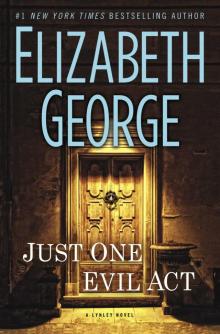 Just One Evil Act
Just One Evil Act This Body of Death
This Body of Death The Edge of the Water
The Edge of the Water For the Sake of Elena
For the Sake of Elena Believing the Lie
Believing the Lie The Edge of the Shadows
The Edge of the Shadows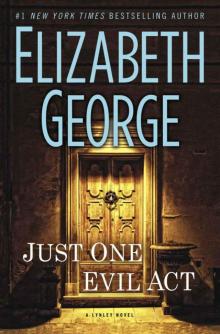 Just One Evil Act: A Lynley Novel
Just One Evil Act: A Lynley Novel In Pursuit of the Proper Sinner
In Pursuit of the Proper Sinner A Moment on the Edge:100 Years of Crime Stories by women
A Moment on the Edge:100 Years of Crime Stories by women Elizabeth I
Elizabeth I I, Richard
I, Richard A Traitor to Memory
A Traitor to Memory Missing Joseph
Missing Joseph A Suitable Vengeance
A Suitable Vengeance Careless in Red
Careless in Red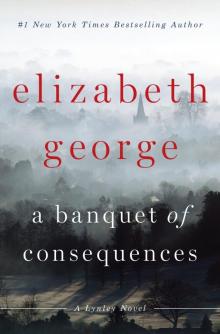 A Banquet of Consequences
A Banquet of Consequences Playing for the Ashes
Playing for the Ashes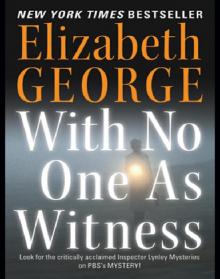 With No One As Witness
With No One As Witness Deception on His Mind
Deception on His Mind The Best American Mystery Stories 2016
The Best American Mystery Stories 2016 A Great Deliverance
A Great Deliverance In the Presence of the Enemy
In the Presence of the Enemy Believing the Lie il-17
Believing the Lie il-17 The Edge of the Light
The Edge of the Light SW01 - The Edge of Nowhere
SW01 - The Edge of Nowhere A Place of Hiding
A Place of Hiding What Came Before He Shot Her il-14
What Came Before He Shot Her il-14 Payment In Blood
Payment In Blood The Punishment She Deserves
The Punishment She Deserves This Body of Death: An Inspector Lynley Novel
This Body of Death: An Inspector Lynley Novel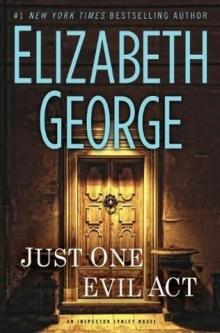 Just One Evil Act il-18
Just One Evil Act il-18 What Came Before He Shot Her
What Came Before He Shot Her Missing Joseph il-6
Missing Joseph il-6